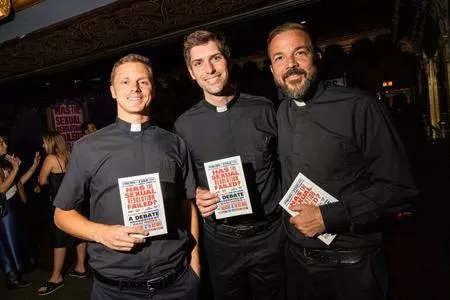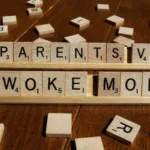
Published October 13, 2023
Three priests walk into a hip enclave to discuss the sexual revolution … but rather than a punchline, what ensued was a striking reminder that, amid cultural revolutions, orthodoxy just might be the most subversive lifestyle of all.
To set the stage, I didn’t think too much of it when a few priest friends reached out to see if my husband and I were planning to attend The Free Press debate on the sexual revolution in downtown Los Angeles. All three priests are deeply engaged in the intellectual life and invested in the struggles of those in their pastoral care. That they’d be eager to attend this event seemed unsurprising. What I should have anticipated was the degree to which they would quietly steal the show.
From the moment we entered The Ace Theater, they were a bit of a spectacle. Three handsome young men in collars in the heart of a very downtown scene understandably invited attention. Heads and cameras turned toward them, and a steady stream of attendees approached to say hello, greeting them as you might a childhood friend who’d gone off to live an unconventional life in a faraway land. Seeing a Catholic priest is certainly familiar enough to most, but juxtaposed against the theme of sexual revolution, young men faithful to a life of celibacy is entirely foreign.
The anomaly of their presence was given a nod in Vanity Fair’s coverage of the evening, which referenced “a group of extremely handsome priests, or handsome men dressed like priests …” That these men might be impersonating priests seemed to some to be just as likely as being actual priests. But never mind. The spirit of the evening and of The Free Press is one of unsettling the settled grooves of secular dogmas in pursuit of truth. Three young men who have freely given their lives in their entirety for the sake of that mission fit into the evening in a far deeper way.
Most attendees appeared to agree. Father Michael Masteller, who serves St. Helen Catholic Church in South Gate, California, said, “I sensed a communion not on the level of belief (it was quite a diverse crowd!) but on the level of desire: There was a common desire for truth, for a deeper and more honest conversation, for an intentional path forward. … Our presence as priests did not attract dismissal or disrespect; on the contrary, it seemed to invite surprised and curious conversations with various people.”
Father Brian Humphrey, another Archdiocese of Los Angeles priest, who is currently studying in Rome, said that he mainly went to watch and to listen: “I encountered people hungry for the truth. You could feel it. They seemed tired of the propaganda machines and just wanted to know what really happened and where this all might be going.”
Father Matt Wheeler of the Church of the Visitation in Los Angeles had agreed to attend expecting it to be a staid and small event in some sort of hall somewhere. “I was blown away when we approached a line of hundreds spanning around the corner of a busy downtown L.A. historic theater. For me, it was a big deal to see 1,600 young people, from all walks of life, packed in a huge auditorium ready to engage in real discussions about an elephant-in-the-room kinda issue. It was really refreshing.”
The debate — titled “Has the Sexual Revolution Failed?” — included two women on the affirmative side (author Louise Perry and podcaster Anna Khachiyan) and two dissenting (the formerly Muslim podcaster Sarah Haider and Grimes, a singer and ex of Elon Musk). Ultimately, the actual debate was centered more on whether the revolution had gone too far or not far enough, rather than on the nature of the revolution and the terms of its success or failure. Nevertheless, to propose it might have failed when the tenets of the revolution have been considered axiomatic for decades is itself a beginning of an end.
“To even question the success of the sexual revolution in a secular context reveals that something is not going right,” Father Masteller said. “What are the problems? What are people hoping for? What needs to change or stay the same? I was curious to see in what way the culture today understands and engages this profoundly important topic of human love and sexuality.”
For Father Wheeler, the evening held a practical purpose as well. “I constantly deal with issues surrounding the sexual revolution in my priestly ministry. So I was interested to hear what secular society had to say and hoped to pick up a few ideas for helping young people embrace the Good News of the Church’s beautiful teaching on human sexuality.”
The topics ranged from pornography to motherhood, happiness statistics to abortion. The panelists generally agreed that a return to the 1950s was not what they sought, but, more interestingly, they also agreed that the current chaos is unsustainable and the resultant misery and social pathologies need addressing in one way or another.
“One moment I found interesting was when the panelists all seemed to agree that true freedom doesn’t consist in simply being without any outside rule — it comes when we live in accord with what is best for us. But then when asked how we know what is best for us, nobody could really give an answer,” Father Humphrey said. “I thought Louise Perry was on point when she said some things like, ‘Just be normal,’ and ‘Do what your grandmother would tell you.’ Perhaps that would have been a good moment in the conversation to consider the truths of natural law — not to mention divine law — as guiding lights toward true freedom.”
The panelists did an admirable and entertaining job, but they did not address the fundamental issue that the sexual revolution — like all ideological revolutions — is a denial of objective and stabilizing truths of human nature. The revolution is a declaration of defiance against the concept of an objective moral order and even of bodily reality. Our stubborn bodies, which carry the implacable logic of law and nature, are something from which we must be freed, this ideology says, through artificial contraceptives, cross-sex hormones and surgeries, or by the eviction of the child in the womb, whose very existence proclaims a depth of meaning to sex that the revolution cannot stomach.
Because it is a revolution ultimately against nature and nature’s author, it leads to all sorts of divisions and dystopias that become increasingly hard to paper over. If sex is meaningless, why do so many people find themselves bonded and then broken by its casual treatment? Why is the same revolution that promised female empowerment unequipped to even determine what women are much less defend their needs or identify their value? If the revolution’s promise — that sex and our bodies can be anything — really communicates that they mean nothing, then how can we possibly find any basis for human dignity? Such cracks and fissures eventually become too hazardous to ignore.
Father Wheeler saw this underlying nihilism contrasting with the joy on offer in a life in Christ, rooted in a robust Catholic theology that includes a theology of the body. “At the end of the debate, I felt so thankful for my Catholic faith: It’s ordered, purpose-driven and all-encompassing. I say this because although many interesting points and insights were brought up, it was clear that those debating lacked an overall telos [ultimate end] and therefore struggled to articulate a clear way forward.”
Father Masteller added, “I hope that our presence sent a clear message that the Church is still greatly interested and concerned with the culture and wants to listen deeply to the hopes and struggles of this age, so as to offer the light of truth to those who do not want to walk in darkness.”
Has the sexual revolution failed? Yes. Spectacularly. That is not to say that we need to return to another era; I want to live in this one. But the core of the revolution is not about particular policies or rooting out hypocrisies or correcting boorish men. Those are important but tangential fights and ones that reasonable people should be able to discuss and agree on for the most part. The core question is whether we as a culture believe that our embodied lives mean anything at all. As the evening indicated, amid the carnage left in the wake of the sexual revolution, people are asking all sorts of questions that are both old and new.
To answer those questions, we need not assume the oft-tried desperate posture of fawning after cultural relevancy. Truth is enduringly relevant because it speaks to the deepest longings of the soul. We should instead have great confidence in the nobility on offer in a life of grace.
Young priests who are faithful to their vocation are such a contradiction to the sexual revolution that their very presence invites one to consider seriously the supernatural. That can be a jarring consideration, but it is finally the one that is behind and inside all our other questions.
Noelle Mering is a fellow at the Ethics and Public Policy Center. She is the author of Awake, Not Woke: A Christian Response to the Cult of Progressive Ideology and co-author of the Theology of Home series. She is an editor at TheologyofHome.com and a wife and mother of six children.
Noelle Mering is a Fellow at the Ethics and Public Policy Center where she co-directs EPPC’s Theology of Home Project. She is the author of the book Awake, Not Woke: A Christian Response to the Cult of Progressive Ideology (TAN Books, May 2021).












